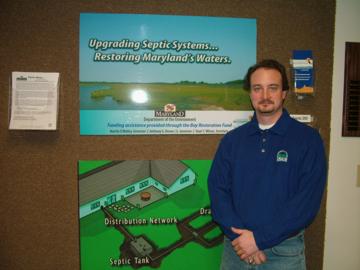 One of John Boris’s jobs is to help manage Chesapeake Bay Restoration Fund projects. He is one of three project managers and has about ten years of experience in his field. John is a certified sanitarian who serves to make the health of Maryland’s citizens a priority.
One of John Boris’s jobs is to help manage Chesapeake Bay Restoration Fund projects. He is one of three project managers and has about ten years of experience in his field. John is a certified sanitarian who serves to make the health of Maryland’s citizens a priority.
John comes from outside of Pittsburgh, Pennsylvania, a city that contains many of the industries and features found in Baltimore City. Some of his immediate family worked in Pittsburgh to help promote a cleaner environment, which inspired John to pursue a career in the environmental field. He would eventually become an eagle scout and graduate with a Bachelor’s degree in Earth Science from Clarion University in Pennsylvania. During his youth, John recalls that dust from factories in Pittsburgh would collect on cars and air pollution would be so heavy that “you couldn’t even see the sun around mid-afternoon.”
John was the first hire of project managers for the Bay Restoration Fund at MDE. In previous years, he worked for county governments and private industry managing a variety of aspects of soil and groundwater studies. His major focus in recent months has been to promote the new septic grants that allow Marylanders to upgrade their septic systems throughout the state. The program is designed to be a long-term solution that will significantly reduce the amount of nitrogen entering into the Chesapeake Bay, particularly in the Critical Areas of the state.
The idea that all drains lead to the ocean rings a lot of truth when it comes to understanding watersheds and the Chesapeake Bay. Even someone in the furthest reaches of our state can impact all of our streams and waterways by simply having a faulty septic system on their property. It may take several months or years, but eventually those pollutants will reach the Chesapeake Bay through groundwater or stormwater runoff. These pollutants can cause everything from decreased levels of fish and crabs to algae blooms causing even more problems for the habitats living in these conditions.
Promoting and implementing the Bay Restoration Fund’s septic upgrade program will benefit not only the public health of Maryland and all our residents, it will also help to restore the health of the Chesapeake Bay and local waterways. John says that in order for this to work, “tools need to be in place for a positive change.” He, along with many environmental advocates, believes there is still much work to be done to restore places like the Chesapeake Bay. Utilizing better technology so we can use our resources more efficiently is essential to ensuring pollution levels are kept to a minimum. Although many of these actions may seem small or miniscule, “The little things that we do,” John says, “Will have a greater impact in long term solutions.”
John Boris believes cleaning up the Chesapeake Bay and improving our local waterways is not a problem that will be solved overnight but through the ongoing efforts of many Marylanders, making this a very achievable goal for the State.